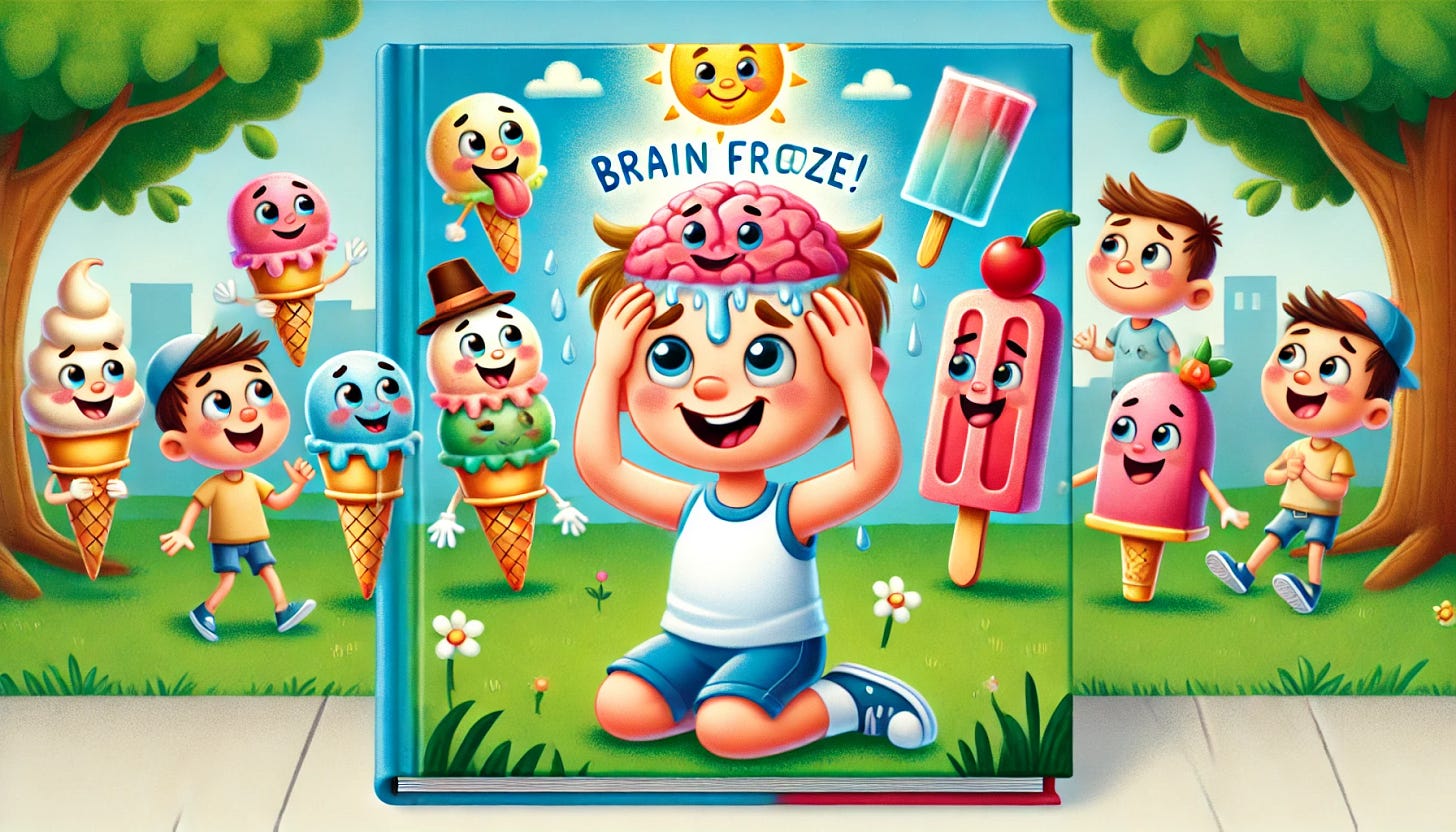What is a Brain Freeze?
Hi there! Have you ever taken a big bite of ice cream or a giant sip of a cold slushy, and suddenly felt a sharp pain in your head? It feels like your brain is freezing, right? But don’t worry—your brain isn’t actually turning into an ice cube. This funny and sometimes painful feeling is called a brain freeze, and it’s something many people experience. Let’s dive into the cool science behind this chilly sensation!
Hello my friends!
For a quick note, welcome to Tidbits with Titus, a podcast and newsletter where we tackle the big, curious questions kids ask every day in fun, bite-sized ways! I’m Alexander Titus, but I go by Titus. I’m a scientist, adventurer, and a huge fan of making science, technology, and life accessible to all ages. From “How does electricity work?” to “What are taxes?” and even “Why is the sky blue?” I’m here to dive into these wonder-filled questions with engaging stories and simple explanations that spark curiosity and make learning a joy. This effort is all about creating a space where families can learn together, discover the magic of the every day, and find thoughtful ways to explore the world’s big mysteries. Let’s make curiosity a family tradition—one tidbit at a time!
Just so you know, these podcast episodes are all AI-generated using Google’s really cool NotebookLM technology. That means there are some errors in how words are said, but that is part of the fun!
If your little ones have questions that you want help answering, shoot me an email at questions@tidbitswithtitus.com and I’ll see what I can do!
You can subscribe to the newsletter that has this information as well at tidbitswithtitus.com.
Also please share with anyone you think would be interested. The more the merrier!
Cheers,
-Titus
Why Do We Call It a Brain Freeze?
Even though we call it a brain freeze, the cold sensation doesn’t really happen in your brain. It’s just a nickname because it feels like your brain is frozen. Scientists also call it sphenopalatine ganglioneuralgia. That’s a really big word, but you can just call it brain freeze—much easier, right?
What Causes a Brain Freeze?
A brain freeze happens when something super cold, like ice cream or a cold drink, touches the roof of your mouth. Here’s how it works:
Cold Hits the Roof of Your Mouth: When you eat or drink something very cold quickly, it touches a part of your mouth called the palate (that’s the roof of your mouth).
Nerves React to the Cold: The cold tricks the nerves in your mouth into thinking something is wrong. These nerves send a message to your brain saying, “Hey, it’s freezing down here!”
Blood Vessels Respond: To warm up, the blood vessels in your mouth get smaller very quickly (they tighten up). Then, they get bigger again just as fast to let warm blood flow back in. This rapid change in size creates the pain you feel.
Your Brain Feels the Pain: Even though the pain is happening in your mouth, your brain gets the message and thinks it’s coming from your head. That’s why it feels like your forehead or temples are hurting instead of your mouth.
How Long Does a Brain Freeze Last?
The good news is that a brain freeze doesn’t last long! Most of the time, it only lasts for a few seconds or up to a minute. But it can feel much longer when you’re in the middle of it, right?
Why Doesn’t Everyone Get Brain Freeze?
Not everyone gets brain freeze, and that’s okay. Some people’s nerves and blood vessels react differently to cold things. Scientists are still studying why this happens, but it’s one of those fun mysteries of the human body.
How to Stop a Brain Freeze
If you get a brain freeze, there are a few tricks you can try to make it go away faster:
Warm the Roof of Your Mouth: Press your tongue against the roof of your mouth. Your tongue is warm and can help melt the cold away.
Drink Something Warm: If you have a warm drink nearby, take a sip to help warm up your mouth.
Cover Your Mouth and Nose: Breathe in and out through your hands to warm up the air you’re breathing. This can help warm your palate too.
Eat Slowly: To avoid brain freeze, try eating or drinking cold things more slowly. This gives your body time to adjust to the cold.
Why Do We Feel Pain in Our Head Instead of Our Mouth?
This is a great question! The reason you feel the pain in your head instead of your mouth has to do with something called referred pain. Referred pain happens when your brain gets confused about where the pain is coming from. Since the nerves in your mouth are connected to the same system as the nerves in your head, your brain thinks the pain is coming from your forehead or temples. Silly brain!
Are Animals Affected by Brain Freeze?
Have you ever wondered if your dog or cat gets brain freeze when they eat something cold? Scientists think animals might experience something similar to brain freeze, but they can’t tell us how they feel. That’s another mystery to explore!
Fun Facts About Brain Freeze
Here are some cool (get it?) facts about brain freeze:
It’s Really Fast: Brain freeze can happen just a few seconds after eating or drinking something cold.
Ice Cream Lovers Get It More: If you eat ice cream quickly, you’re more likely to experience brain freeze.
It’s Harmless: While brain freeze might hurt for a little bit, it’s not dangerous and doesn’t cause any damage to your brain or body.
It Helps Scientists Learn About Pain: Studying brain freeze helps scientists understand how pain works in the body.
What Else Can We Learn From Brain Freeze?
Brain freeze is not only interesting but also helpful for scientists. By studying brain freeze, they can learn more about how the nerves in our body work and how we feel pain. This might help them find better ways to treat headaches and other kinds of pain.
A World Without Brain Freeze?
Imagine a world where you could eat as much ice cream as you want without ever getting a brain freeze! While that sounds fun, brain freeze is actually your body’s way of protecting you. It’s like your body saying, “Hey, slow down and take it easy!”
Why Does Your Body React This Way?
Your body is super smart. It uses brain freeze to let you know that something is too cold and could be harmful if you’re not careful. It’s like a little alarm system for your body.
What If Brain Freeze Didn’t Exist?
Without brain freeze, we might not notice when we’re eating something that’s too cold. This could hurt our teeth or mouth. So even though brain freeze can be annoying, it’s actually a helpful thing!
Experiment Time: Can You Make a Brain Freeze Happen?
Here’s a fun experiment you can try (with permission from an adult):
Get a cold drink, like a slushy or a milkshake.
Take a big sip and hold it in your mouth.
Pay attention to how your mouth feels. Does a brain freeze happen? How long does it last?
This is a fun way to learn more about how your body reacts to cold things. Just remember not to drink too much too fast—you don’t want too many brain freezes in one day!
What Should You Remember About Brain Freeze?
The next time you take a bite of ice cream and feel that sharp pain, you’ll know it’s just your body’s way of saying, “Whoa, that’s cold!” Brain freeze is a little reminder to slow down and enjoy your treat.
Conclusion
Now you know all about brain freeze! It’s a funny, harmless feeling that happens when something super cold touches the roof of your mouth. Even though it can hurt for a little bit, it’s your body’s way of protecting you. So the next time you feel a brain freeze, you can smile (after it’s over) and say, “Thanks, body!”
Enjoy your ice cream and slushies—but remember to eat them slowly to avoid the chill!












